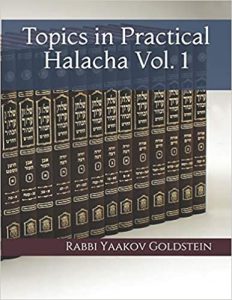*As an Amazon Associate I earn from qualifying purchases.
May a Kohen enter into a room that contains the cremated remains of a loved one?
Background:
Unfortunately, cremating the dead has become all too common amongst people, including irreligious Jews both in Israel and around the world. Doing so is severely forbidden according to Jewish law due to it transgressing the positive command to bury the dead[1], and due to the transgression of desecrating the honor of the deceased[2], and raises the following questions vis-a-vis a Kohen: The ash of a loved one who was cremated is commonly kept for sentimental purposes in a jar in the home of the children or other close relatives of the deceased. The question arises as to whether a Kohen may touch, or enter into a room that contains such ash. Does the ash of a corpse give off Tuma? This question becomes common when visiting irreligious Jews for Shlichus purposes, in which many a times one may encounter such a scenario.
The law:[3]
Many Poskim[4] rule that the ash of a corpse [which has no bone fragments remaining] does not give off impurity and hence there is no prohibition for a Kohen to be in contact with the ash or be in the same room as it. [Thus, a Kohen may enter into a room that contains the cremated remains of a person and may even hold the jar or ash in his hand.[5] This applies whether the ashes belong to a Jewish corpse or gentile corpse.] However, other Poskim[6] rule that the ash of a corpse does give off impurity and it is hence forbidden for a Kohen to the file himself to.[7] Practically, one may certainly be lenient regarding entering Tumas Ohel to enter a room that contains the ash of a corpse[8], and those who are lenient to even touch and move the ash have upon him to rely as so is the main opinion in the Poskim. [This question especially arose after the Holocaust in which millions of Jews were burned in the crematorium, and the collective ashes were later taken and buried and Kohanim who had loved ones who were killed and burned asked if they can visit the burial site of the ash, the vast majority of Poskim concluded that it is allowed.[9]]
__________________________________________________________
[1] Devarim 21:23 “Don’t allow his corpse to remain on the tree, you shall bury it”; Rebbe Yochanon in Sanhedrin 46b; “Minayin Limeilin Sheoveir…”; Admur 526:1 “Positive command of burial”; 495 KU”A 3 “Negative command of Baal Salin”; Michaber Y.D. 362:1 “One who places the body in a casket and does not bury it transgresses “Lo Salin”; Rambam Avel 12:1, as understood by Lechem Mishneh, and Sefer Hamitzvos 231; Chinuch 537
[2] See Noda Beyehuda Tinyana 210; Chasam Sofer Y.D. 336; Shagas Aryeh 6; Kesav Sofer Y.D. 174; See Ramban on Devarim 21:23
[3] See Hamiaseif 9:17-13; Anei Shoham Inyanei Hageluyos Yimei Hazam p. 436; Sefer Emek Habacha 2; Chayeh Olam; Koveitz Beis Yisrael 211 p. 124; Dibros Eliyahu 8:74
[4] Sheilas Yaavetz 2:169, brought in Pischeiy Teshuvah Y.D. 369:2; Rambam Tumas Meis 3:10 “The flesh of a corpse which has disintegrated and become like flour is pure and so too the ash of a corpse is pure”; Chachamim in Mishneh Ohalos 2:2; Taam Vadaas; Milameid Lehoil Y.D. 2:114 in name of Ramban, Rashba, Ran and Ritva; Seridei Eish 1:181; Chelkas Yaakov Y.D. 217; Minchas Yitzchak 1:30
[5] Cremated bodies are burnt at temperatures between 1400-1800 Fahrenheit for about 2-2.5 hours. The bones are reduced to calcified matter which are later crushed and processed, being reduced to ash like particles. Thus, in a jar containing the cremated remains of a person there are no remaining body particles that pose a Halachic issue for a Kohen regarding the laws of impurity.
[6] Rebbe Eliezer in the Mishneh ibid; Lechem Hapanim 364; Shut Harashbash 610; Tosafus Nida 27b; Paneiach Raza Parshas Korach; Shevet Shimon Chidushei Sugyos
[7] The reason: Rebbe Eliezer in the Mishneh ibid holds that the ash of a corpse does give Tuma. Furthermore, some Poskim rule that even according to Chachamim, the ash of a corpse is only considered to not give off impurity if it was burned while the person was still alive as it never had an opportunity to give off impurity, however, if it was burned after death, then since it gave off impurity prior to the burning, it’s ashes remain impure and may not be touched by a Kohen. [Shevet Shimon Chidushei Sugyos] Furthermore, some Poskim rule that ash of a corpse always gives off impurity being that it contains the Luz bone which is not able to be destroyed and from which the resurrection will occur and hence it is forbidden for a Kohen to defile himself to it. [Beis Yisrael p. 33, based on Lechem Hapanim 364] Practically, however, the Poskim negate the above claims, as it is clear from the wording of the Rambam ibid that ash never gives off impurity even if the corpse was burned after death as he previously states that flesh which disintegrates and becomes like flour is pure. Likewise, it is clear from the Talmud that the Luz bone does not give off impurity. [Sheilas Yaavetz ibid]
[8] Chelkas Yaakov Y.D. 217; Dibros Eliyahu ibid
[9] See Hamiaseif 9:17-13; Anei Shoham Inyanei Hageluyos Yimei Hazam p. 436; Sefer Emek Habacha 2; Chayeh Olam; Koveitz Beis Yisrael 211 p. 124


 Donate
Donate
Leave A Comment?
You must be logged in to post a comment.